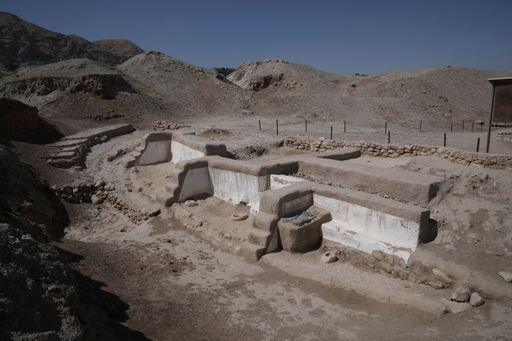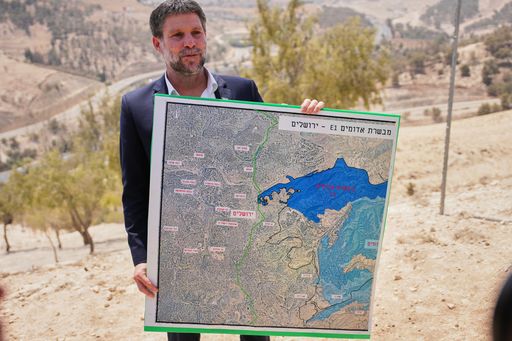Israel’s decision to build thousands of houses for Jewish settlers in the occupied West Bank has drawn widespread condemnation from the United Nations, Türkiye and other countries.
The plan, which the Palestinian Authority has called a “dangerous escalation”, has prompted concerns that Tel Aviv is erasing any prospect for a future Palestinian state.
Israel wants to build 3,400 housing units for an illegal settlement in occupied East Jerusalem in an area known as E1 or East One. Another 350 homes are planned for the Jewish settlement of Ashael near Hebron.
The project, approved by Israel’s far-right Finance Minister Bezalel Smotrich, aims to effectively split the occupied West Bank into northern and southern parts, severing connections between major cities and isolating occupied East Jerusalem.
The settlement project has been under consideration for more than two decades and has been one of the most contentious issues in the Israeli-Palestinian conflict, with international pressure previously freezing its progress.
US officials emphasised that settlement expansion threatens the viability of a two-state solution and undermines efforts to achieve a negotiated settlement between Israel and Palestine.
Around 500,000 illegal Israeli settlers live in the occupied West Bank under the protection of the Israeli military. Over the years, the three million Palestinians in the occupied West Bank have been pushed into narrow ghettos where their basic rights to move around and own real estate are routinely trampled upon by the Israeli occupation forces.

Two-state solution in limbo
The United Nations issued one of the strongest condemnations on Wednesday, with Secretary-General Antonio Guterres’ spokesperson Stephane Dujarric stating that Israeli settlements in the occupied West Bank, including occupied East Jerusalem, are a violation of international law and run counter to UN resolutions.
The UN warned that the advancement of the E1 project poses an existential threat to the two-state solution by fragmenting Palestinian territory and undermining territorial continuity.
The statement called on Israel to immediately halt all settlement activity and comply fully with its obligations under international law, in line with UN resolutions and the International Court of Justice’s Advisory Opinion of July 19, 2024.
European nations also reacted strongly.
Italy, through Foreign Minister Antonio Tajani, urged Israel on Wednesday to cooperate with the Palestinian Authority to strengthen regional stability.
Tajani described the Israeli decision to advance new settlements as “unacceptable” and contrary to international law, warning that it risks definitively compromising the two-state solution, which Italy continues to support with conviction and commitment.
United Kingdom’s Foreign Secretary David Lammy condemned the E1 settlement plan as “a flagrant breach of international law” that, if implemented, would divide the West Bank and critically undermine the two-state solution.
“The Israeli government must reverse this decision,” Lammy said.
France, earlier on Saturday, expressed its opposition to Israel’s plan, saying that the settlement project is “a serious violation of international law.”
The Netherlands and Belgium voiced similar concerns.
Dutch Foreign Minister Caspar Veldkamp said on his X account that the Israeli plan would make a future Palestinian state virtually impossible.

Türkiye to continue to support Palestine
Türkiye, one of the main supporters of the State of Palestine, earlier condemned Israel’s decision to expand Jewish settlements, calling the plan a blatant disregard for international law and UN resolutions.
The Turkish Foreign Ministry said in a statement that the settlement expansion threatens the territorial integrity of the Palestinian state and undermines the foundation for a two-state solution.
“We will continue to support the legitimate cause and steadfast efforts of the Palestinian people,” the ministry said.
Ankara reaffirmed its support for an independent and sovereign Palestinian state with East Jerusalem as its capital and reiterated its backing for the Palestinian cause.
The Palestinian Authority, separately, described the settlement approval as a direct attack on the possibility of a future Palestinian state.
The Palestinian Foreign Ministry said that the E1 project “fragments geographic and demographic unity,” dividing the West Bank into isolated cantons disconnected from each other, effectively turning them into “real prisons.”
Palestinian officials warned that the plan is part of Prime Minister Benjamin Netanyahu’s vision for a “Greater Israel,” which aims to entrench the occupation and eliminate the viability of a Palestinian state.
Erasing Palestine off the map
Israeli authorities defended the project as part of long-term planning, with Finance Minister Bezalel Smotrich, a former settler leader, framing the approval as a rebuke to Western countries that recently announced intentions to recognise a Palestinian state.
Smotrich said that “the Palestinian state is being erased from the table not with slogans but with actions,” and stressed that every settlement, neighbourhood, and housing unit is “another nail in the coffin” of a Palestinian state.
The US, while defending Israel’s right to security, says that settlement projects in the occupied Palestinian territories are a major obstacle to peace.
A US State Department spokesperson last week said that “a stable West Bank keeps Israel secure” and is in line with Donald Trump’s goal to achieve peace in the region.




















